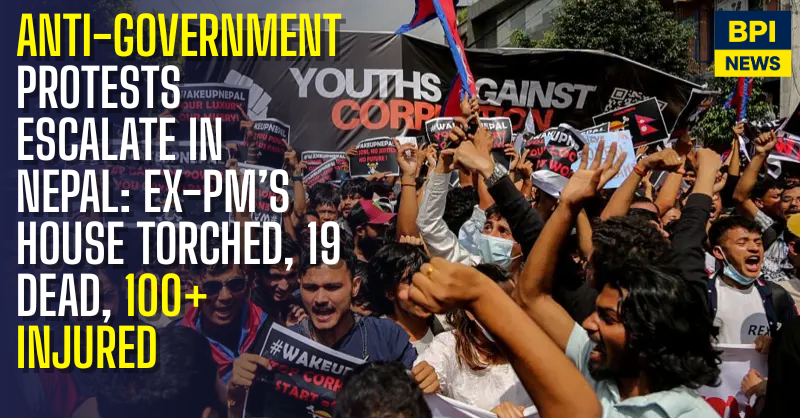Nepal is facing its most intense unrest in years after anti-government protests spiralled into violence, leaving at least 19 people dead and more than 100 injured. Demonstrators have torched the home of a former prime minister and set fire to government buildings in the capital, Kathmandu.
The protests, driven largely by students and young people, erupted after the government attempted to ban 26 social media platforms, including Facebook and YouTube, citing concerns over fake news and online fraud.
The ban was repealed within days following widespread backlash, but the anger has persisted, fuelled by accusations of corruption and nepotism among Nepal’s political elite.
‘Nepo Kids’ Campaign Sparks Fury
In the weeks before the ban, a viral online campaign spotlighted the privileged lifestyles of politicians’ children dubbed “nepo kids” intensifying frustration over inequality and lack of accountability.
With youth unemployment at 20.8% and a third of Nepal’s GDP reliant on remittances from citizens working abroad, the allegations struck a chord with young Nepalis, many of whom rely heavily on social media for connection, news, and business.
Violence in the Capital
Crowds gathered outside parliament in Kathmandu on Monday chanting “enough is enough” and “end corruption.” Protesters hurled stones, set motorbikes ablaze, and ignited the Survey Department building. Witnesses reported injured demonstrators being rushed to hospital on motorbikes, including one man with a serious leg wound.
Despite a curfew in the Kathmandu Valley, demonstrators also set fire to the homes of political leaders, including a former prime minister. Police responded with water cannons, rubber bullets, and batons in a bid to restore order.
Government Response
The government has pledged to regulate social media to prevent online abuse but faces accusations of attempting to silence dissent.
Former foreign minister NP Saud of the Nepali Congress admitted corruption and nepotism were long-standing issues but said they must be addressed through constitutional and legal processes. Communist Party leader Pradeep Gyawali said allegations should be assessed case by case, arguing that children of politicians should not automatically be disqualified from opportunities if qualified.
Protesters’ Demands
Many demonstrators are now calling for Prime Minister KP Sharma Oli to resign, accusing the government of authoritarian behaviour.
One protester told the BBC: “The social media ban was just the reason we gathered. Everyone’s focus is on corruption. We want our country back.” Another said the government tried to silence their voices: “We came to raise them, and we will continue until it brings change.”
With unions now calling for mass demonstrations on 18 September, the unrest shows little sign of easing.


